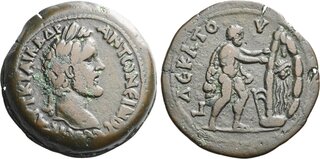| Numismatica Ars Classica > Auction 144 with CNG & NGSA | Auction date: 8 May 2024 |
| Lot number: 1082 Price realized: This lot is for sale in an upcoming auction - Bid on this lot  | Show similar lots on CoinArchives Find similar lots in upcoming auctions on |
| Lot description: The Geoffrey Cope Collection of Ancient Greek and Roman Bronzes. The Roman Empire. Antoninus Pius augustus, 138 –161. Description Drachm, Alexandria 146-147 (year 10), Æ 34 mm, 27.45 g. ΑΥΤ Κ Τ ΑΙΛ ΑΔΡ ΑΝΤωΝΕΙΝΟ? ?ΕΒ ΕΥ? Laureate head r. Rev. L ΔΕΚΑΤΟΥ Heracles and the stables of Augeas: Heracles advancing, r., lion skin over shoulder, arms extended to wall of rocks, in which human- (or lion-) headed spout from which water flows; against rocks, mattock. Reference Dattari–Savio 8497 Geissen 1540 RPC 995.26 (this coin) Condition In unusually fine condition for the issue. A fascinating and interesting reverse type. Lovely brown tone and very fine / good very fine Provenance Stack's sale 10th June 1970, Knobloch, 564 NFA-Leu sale 16th May 1984, Garrett, 803 CNA sale 13, 1990, Wetterstrom, 197 Note: This drachm illustrates the Fifth Labour of Heracles on its reverse-the cleaning of the Augean Stables. King Augeas was renowned in Greece for the vast herds of animals that he possessed and Eurystheus determined that as his fifth task, Heracles should be required to clean out Augeas' stables in a single day. This was definitely a less dangerous Labour than some of the others, but it was easily the most foul-smelling and most seemingly difficult. Nevertheless, Heracles had a plan. When he went to Augeas, he failed to mention that he was actually in service to Eurystheus and instead offered to clean the stables in one day in return for half of the animals in payment. Scoffing at this, Augeas agreed and then watched in amazement as Heracles tore holes in opposite walls of the stable building and proceeded to divert a river in order to flush out the filth. This very moment is depicted on the reverse of this remarkable coin. Heracles appears in the very act of tearing open one of the walls while the plough used to divert the river is shown before the massive hole. Meanwhile, peering through the damaged wall one can clearly see the river god flowing with his cleansing waters. Unfortunately for Heracles, when Augeas learned that the hero was undertaking his Labours for Eurystheus, the king refused to pay until he was compelled by a judge. Likewise, when Heracles returned to Mycenae driving his new herd of livestock before him, Eurystheus refused to recognise the completion of the task on the grounds that the Heracles had been paid for his work. Estimate: 3500 CHF |  |



